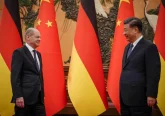The past five years have been deemed a “Golden Era” in Britain-China relations, with the two countries promoting bilateral trade and investments. However, as the Coronavirus pandemic marches on, this relationship seems to be souring. Voices in Britain, especially in Conservative environments, have raised need to rethink or reset the nation’s relationship with China, who is accused of misinforming and mismanaging the pandemic. While Coronavirus is exacerbating tensions, it would though be incorrect to blame it fully for the chill in relations. A distancing from China was already occurring prior to the pandemic.
The foundations of the “Golden Era” were established during the Conservatives’ return to government in 2010. Chinese investments in the United Kingdom were seen as a key source of capital, which could compensate for the cuts in public expenditure caused by the 2007-10 financial crisis and ensuing budget deficits. In 2015, Britain, despite opposition from the United States, joined the Beijing-sponsored Asian Infrastructure Investment Bank (AIIB). That same year, President Xi Jinping triumphantly visited London between 19-23 October, and signed a number of deals on trade, investments, finance, and other matters. Despite criticism that Britain was too deferential to China’s economic power and the uncertainties of Brexit, relations remained substantially positive through the first half of 2019. Britain had meanwhile become China’s major recipient of Foreign Direct Investments in Europe.
Tension started arising after the beginning of the “trade wars” between the United States and China and the emergence of issues of security linked to the potential Huawei’s accession to Britain’s 5G system. The US had mounted a strong campaign against the Huawei deal. Yet on 28 January, London agreed to the much-debated Huawei concession, although on rather limited terms. By 2020, Britain was increasingly squeezed between the importance of maintaining solid economic ties with China and anti-Chinese pressure coming from the United States.
Then enter Coronavirus. When the pandemic started hitting Britain, a number of prominent Conservative politicians, including former and current Cabinet ministers, began blaming China for covering up the Covid-19 outbreak and for allowing it to spread to Europe and the rest of the world. On 4 April, a pro-Conservative newspaper reported on a study to be released by the Henry Jackson Society, a foreign policy think-tank, that called for China to pay a huge sum of money to G7 countries, including £351 billion to Britain. The study also refers to a range of legal avenues Britain and other G7 countries could use to obtain compensation from China like the United Nations, the International Court of Justice, and the World Trade Organization. At the same time, 15 senior Tories led by former Deputy Prime Minister Damian Green have called for a “rethink” and “reset” in a letter to the British Prime Minister on relations with China.
But can this new anti-Chinese sentiment be fully accredited to Coronavirus?
One might think that Britain is taking distance from China because of American pressure. On his visit to London on 30 January, US Secretary of State Mike Pompeo pointed that “The Chinese Communist Party presents the central threat of our times.” A phone call from Trump to Johnson some days after Pompeo’s visit, in which the Huawei deal was discussed, seems to have been all but gentle and friendly. However, in reality London has frictions with Washington on several issues, such as relations with Iran, climate change, and taxes on giant digital corporations. The current tensions between Britain and China mostly have other causes, which are domestic to the United Kingdom and have little to do with American pressure.
It is in fact possible that the current British governing class is developing a new—and more hostile–stance towards China, regardless of both the US and Coronavirus. According to recent research, the cleavage between Remainers and Leavers helps explain attitudes towards Beijing. For example, the rise of China as a military power is a concern to 55% of Leavers, as opposed to 40% of Remainers. Only 13% of Leavers think that China will contribute to global peace more than the US; the figure for Remainers, in contrast, is a much higher 28%. In general, Remainers are more inclined to engage with China on global issues, while Leavers are mostly sceptical about anything Chinese, with the only pragmatic exception of the possibility of a Free Trade Agreement, which would be a high priority for 78% of them. Given that the current British government is largely an expression of pro-Brexit positions and continues to be populated by Leavers, the recent anti-Chinese trends might reflect a latent domestic unease, which had remained silent during the heyday of the “Golden Era.” A shift away from China was thus inevitable.
The Coronavirus crisis has likely exacerbated positions which were already present in a part of British society. Assessing the magnitude of US pressure on Britain’s China policies remains difficult, but data seems to indicate that the origins of anti-Chinese attitudes are endogenous to the United Kingdom and pre-date the pandemic.






